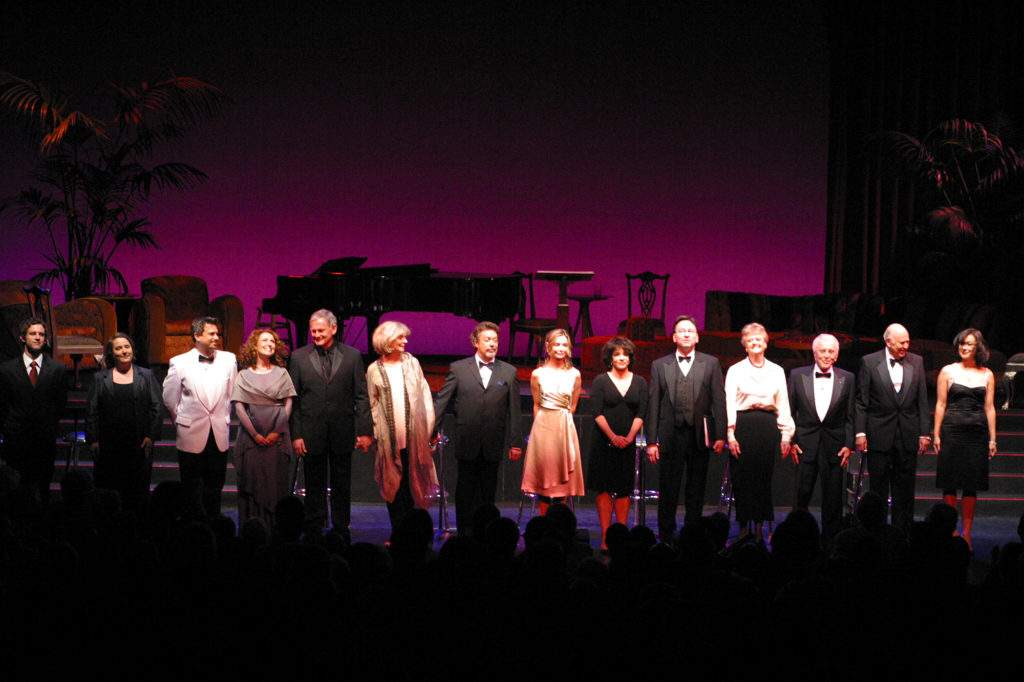All About Eve
A benefit Production at the Ahmanson Theatre for The Actors Fund

Live On Stage
Directed by Gordon Davidson
Starring:
Lauren Ambrose, Jillian Armenante, Stockard Channing, Tim Curry, Blythe Danner, Kirk Douglas, Calista Flockhart, Victor Garber, Angela Lansbury, Melissa Manchester, Carl Reiner, John Ritter and Jennifer Tilly
“Let’s see if we can find the play in the movie,” Gordon Davidson suggested to the group of actors seated around a conference table at A.S.K. Theater Projects one January afternoon. For months, in solitude, I’d been attempting what Gordon was now asking of these actors: to discover the play within ALL ABOUT EVE.
The odyssey began one morning as I was shaving: an old British documentary on the career of Bette Davis was on TV in the background. I turned off the faucet in time to hear the star declaim, “ALL ABOUT EVE was the best script I’d ever been given. It was like a play. We could have opened it on Broadway without changing a word.”
I wondered…
I recalled having seen writer/director Joseph L. Mankiewicz’s 1950 masterpiece ALL ABOUT EVE on television as I was growing up, and how alluring its evocation of life in the New York theatre scene had been. Indeed, over the last fifty years, many of us left our towns and cities to live in New York, hoping we’d find life there as it was depicted in ALL ABOUT EVE: lunch at “21,” late-night bottles of champagne in the Stork Club’s Cub Room, rehearsals, curtain calls, duplex apartments, glittering cocktail parties, taxicabs, personal maids (retired from vaudeville, of course), and, above all, fascinating people with colorful pasts and impressive vocabularies.
In the late 1970s, after having made the pilgrimage myself, I had the peculiar experience of seeing ALL ABOUT EVE on a movie-house screen for the first time (a sold-out double bill with AUNTIE MAME at the Regency Theatre near Lincoln Center). It was one of those evenings that confirmed why I’d moved to New York; a comparable experience just couldn’t have been found back in Pottstown, Pennsylvania. The film possessed its audience that night as if it were a play. Every laugh line landed squarely, every nuance was perceived, every sting paralyzed, and, of course, there was applause after every scene and a roaring ovation at the end of the performance.
Now, years later in Los Angeles, as I shaved, Bette Davis was reminding me of that astonishing, theatrical connection between film and audience.
In a way, ALL ABOUT EVE had always been a play. Its genesis was an incident that occurred during the Broadway run of THE TWO MRS. CARROLLS starring Elisabeth Bergner. Mary Orr, an actress, playwright, and occasional author of radio scripts, used the real-life tale as inspiration for her novella, “The Wisdom of Eve.” In 1946, Cosmopolitan Magazine published Orr’s story, the tale of Margola Cranston (called Margo Channing in the film), a Broadway star, and Eve Harrington, the understudy who wants every role the star plays – including that of wife to Margola’s husband, a stage director. The first dramatization of the story was Orr’s own adaptation for radio in 1949, the same year that Mankiewicz began work on his version for Fox. Orr had retained the stage rights to her story; following the film’s success, she expanded her radio play into a two-act stage version.
According to Joseph Mankiewicz’ son, Tom Mankiewicz (the screenwriter of Superman, Diamonds are Forever, and director of Dragnet and many other films and TV series), his father always thought of ALL ABOUT EVE as a play, albeit one that was to be filmed. Mankiewicz held a lifelong passion for the theatre; he collected rare theatrical texts and manuscripts, attended plays frequently, and was thoroughly well-versed in theatre literature and lore. Though he hadn’t written or directed a play at the time he created ALL ABOUT EVE, the film breathes with an authenticity other big-studio “backstage” films did not.
Mankiewicz made many important changes to “The Wisdom of Eve.” He created the characters Addison deWitt, Birdie Coonan, Bill Sampson, Max Fabian, Miss Caswell and Phoebe. All the characters, especially the female ones, gained psychological complexity. Mankiewicz’ empathy for neurotics and his distinctive gift for witty, trenchant dialogue beautifully serve the story and setting; in the world of ALL ABOUT EVE, insults are flung by knife-throwing professionals, compliments drip like honey laced with hemlock, and whether a scene is one of onstage bravado or offstage self-doubt, ultimately its actors play it to obtain desperately-needed recognition and approval.
The film received fourteen Academy Award nominations – a record that still holds today (tied with TITANIC) – winning six, including Best Picture. Mankiewicz won for his direction and screenplay, which, with his wins for A LETTER TO THREE WIVES the prior year, makes him the only individual to have won both Best Director and Best Screenplay in successive years.
In 1970 the story returned to the stage as the Broadway musical APPLAUSE, starring Lauren Bacall. Betty Comden and Adolph Green authored the book, and composer Charles Strouse and lyricist Lee Adams wrote the score. The show won four Tony awards, including one for Bacall.
But what of Bette Davis’ assertion that the screenplay could have been a play in its own right? Random House would have agreed with her. Though the distinguished publishing house often brought out editions of modern plays, ALL ABOUT EVE was the first screenplay it published. I tracked down a copy, and my excitement grew as each meaty, perfectly constructed scene read as if it had been written exclusively for the stage. Remarkably little information in the film was conveyed solely in visual terms. Therefore, the trick in presenting the script as a play would be to leave the scenes as intact as possible, and find a theatrical way to get in and out of them.
Fortunately, Mankiewicz wrote a great deal of voice-over dialogue. This would be my way into the play – the voice-overs would be direct address to audience, a kind of in-character narration. I restored some voice-over lines cut from the final print of the film, and expanded a few others where needed. Having done that work, I moved on to the structure of the piece, determining where an act break should occur, and how to create the final moment (which is the film’s most visually stunning image).
I knew The Actors Fund was challenged in the months following the 9/11 attacks to meet an unprecedented need for services, and wondered if a single, all-star performance of this ALL ABOUT EVE wouldn’t be a good fundraiser. David Michaels, the Fund’s west coast region director of development, loved the idea, which motivated me to get to the finish line with the adaptation.
By the time I’d come up with a workable draft, Gordon Davidson generously agreed to come onboard as director and arranged for The Actors Fund to present this one-performance only reading at the Ahmanson. Which brings us back to that conference table and our first hearing of my adaptation of the Mankiewicz screenplay. The lives of each of us in the room – actors, producers, director, assistants – intersected at that moment because we love the theatre. ALL ABOUT EVE was part of our mythology, our inspiration. And as the words left the pages and burst into the air we shared that afternoon, something entirely familiar, yet excitingly new, took form.
We’d found the play in the movie.
